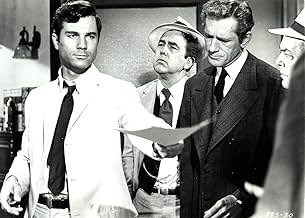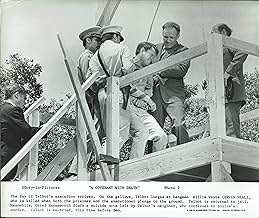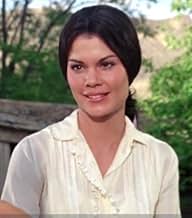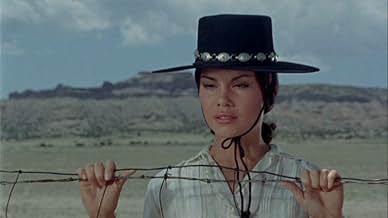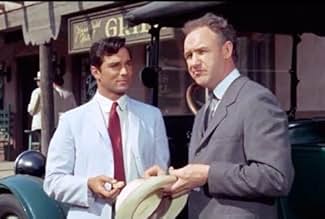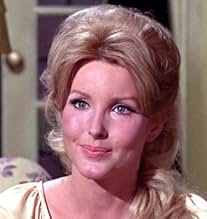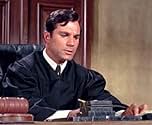AVALIAÇÃO DA IMDb
6,0/10
412
SUA AVALIAÇÃO
Um assassino condenado mata seu carrasco. Mas acaba descobrindo que ele realmente não cometeu o assassinato pelo qual foi condenado.Um assassino condenado mata seu carrasco. Mas acaba descobrindo que ele realmente não cometeu o assassinato pelo qual foi condenado.Um assassino condenado mata seu carrasco. Mas acaba descobrindo que ele realmente não cometeu o assassinato pelo qual foi condenado.
- Direção
- Roteiristas
- Artistas
Emilio Fernández
- Ignacio
- (as Emilio Fernandez)
Walter Bacon
- Trial Spectator
- (não creditado)
Al Bain
- Trial Spectator
- (não creditado)
- Direção
- Roteiristas
- Elenco e equipe completos
- Produção, bilheteria e muito mais no IMDbPro
Avaliações em destaque
There is not much memorable about this film except for the performance of Earl Holliman. His panicked trek up the stairs to the gallows is so perfect, I'm surprised he wasn't nominated for an Oscar. Probably no one saw the movie but if they had, they'd be awed.
I DVR'd this film off of TCM's lineup, frankly because I was intrigued by the title. The only cast members' names I recognized were Gene Hackman, Kent Smith, and Earl Holliman. I'm glad I took a chance on this film.
First, if given the chance, I'd like to shake the hand of Mr. George Maharis. What a wonderful performance he delivers. The rest of the cast is fine, too; and there's no doubt in my mind that they cared about this project and wanted to give it their all. The production is slick, although I concede it feels more like a network movie of the week more than it does a full fledged theatrical release.
One of the aspects of the film that really surprises and pleases me is the representation of a then minority group/characters as forerunners of the plotline. The story centers around a Mexican-American, and while the usual stereotypes and cultural appropriation are present here, the fact that the producers took a chance on making it the focus is worthy of praise. Considering it was released in 1967, it deserves recognition for that fact alone.
If you're cool with melodramas from the late 1960s, you'll like this.
First, if given the chance, I'd like to shake the hand of Mr. George Maharis. What a wonderful performance he delivers. The rest of the cast is fine, too; and there's no doubt in my mind that they cared about this project and wanted to give it their all. The production is slick, although I concede it feels more like a network movie of the week more than it does a full fledged theatrical release.
One of the aspects of the film that really surprises and pleases me is the representation of a then minority group/characters as forerunners of the plotline. The story centers around a Mexican-American, and while the usual stereotypes and cultural appropriation are present here, the fact that the producers took a chance on making it the focus is worthy of praise. Considering it was released in 1967, it deserves recognition for that fact alone.
If you're cool with melodramas from the late 1960s, you'll like this.
If it weren't for the fact that the idea behind this story is interesting, I would have rated it even lower. I haven't read the book, but it gets good reviews. The first several pages of the book in the free preview on Amazon did not feel like it described the same place or people as I saw in this film. The book also doesn't have any music like that in the movie. I think that's a good thing. Much of the music in the movie is forgettable at best, annoying at times.
In this movie there are too many excursions from the main theme, and Maharis isn't good enough to make those non-essential scenes believable or interesting. His scenes with his mother (Katy Jurado), as well as with Rosemary (Laura Devon), seem like mostly filler for a 1 hour 37 minute movie that could/should have been shorter. Katy Jurado was much better in "High Noon". Here she is okay, maybe trying at times a bit too hard to save scenes where Maharis isn't good enough. Devon's scenes -- both in number and length -- feel stretched to keep the movie long enough.
In other words, if you take just the legal and philosophical issues and work them into a television screenplay, this might have worked better as a 1 hour television episode of ... pick your favorite old legal show -- Perry Mason?. It also might have worked as a science fiction story on "Twilight Zone", where often difficult moral issues are faced head on -- such as the one about the robot that is accused of murder.
This movie does feature a couple of attractive actresses (Laura Devon and Wende Wagner), as well as an early-career performance by Gene Hackman and a good effort by Earl Holliman. As I said the main subject matter is interesting too. But don't be surprised if most of this movie doesn't keep your interest.
In this movie there are too many excursions from the main theme, and Maharis isn't good enough to make those non-essential scenes believable or interesting. His scenes with his mother (Katy Jurado), as well as with Rosemary (Laura Devon), seem like mostly filler for a 1 hour 37 minute movie that could/should have been shorter. Katy Jurado was much better in "High Noon". Here she is okay, maybe trying at times a bit too hard to save scenes where Maharis isn't good enough. Devon's scenes -- both in number and length -- feel stretched to keep the movie long enough.
In other words, if you take just the legal and philosophical issues and work them into a television screenplay, this might have worked better as a 1 hour television episode of ... pick your favorite old legal show -- Perry Mason?. It also might have worked as a science fiction story on "Twilight Zone", where often difficult moral issues are faced head on -- such as the one about the robot that is accused of murder.
This movie does feature a couple of attractive actresses (Laura Devon and Wende Wagner), as well as an early-career performance by Gene Hackman and a good effort by Earl Holliman. As I said the main subject matter is interesting too. But don't be surprised if most of this movie doesn't keep your interest.
No need to cover the plot beyond what has already been said. As has also been stated, in many ways this seems like a one-hour teleplay that has been expanded into a feature film. Though billed as a courtroom drama, most of the screen time is taken up with two romantic subplots and a third drama involving the relationship between Maharis and his mother (Jurado).
Maharis is bland as the lead, as are the two women in his life (this is more of a script problem than the actors' faults). Gene Hackman has a fairly small role as the sheriff, so doesn't really get to shine. The one standout, surprisingly, is Earl Holliman. He can often be hammy or wooden, but here he deftly alternates between sympathetic and despicable in the movie's one complex role.
The other standouts in the film are its period setting (early 1900s New Mexico), and the luminous photography by Robert Burks in his next-to-last film.
Maharis is bland as the lead, as are the two women in his life (this is more of a script problem than the actors' faults). Gene Hackman has a fairly small role as the sheriff, so doesn't really get to shine. The one standout, surprisingly, is Earl Holliman. He can often be hammy or wooden, but here he deftly alternates between sympathetic and despicable in the movie's one complex role.
The other standouts in the film are its period setting (early 1900s New Mexico), and the luminous photography by Robert Burks in his next-to-last film.
As the title would indicate the film makers chose to go the high minded, serious legal and moral issues route rather than the trashier steamy, lurid, small town murder trial route. Bad decision. What results is a fairly stiff, dull movie with a few good performances (i.e. Katy Jurado as a New Mexican aristocrat/feminista, Earl Holliman as the unjustly accused good ol boy and an early Gene Hackman turn as a none too bright, racist sheriff). Especially bad is George Maharis in the lead. It's not so much that you simply don't buy a Greek/American actor from Queens , sporting a very outer borough accent, as a a native New Mexican (leaving aside the obvious objection that 1967, when this film was made, is getting late in the day for Brownface) it's that Maharis cannot for the life of him shed his Buzz Murdock persona from "Route 66" with his constant moral outbursts, tendency to fisticuffs and advocacy of the natural as opposed to the "plastic" life. The hippy/dippy scene where he rejects Laura Devon as a wife because she won't curl and uncurl her toes and walk naked in a supermarket has to be a low point not only in Maharis' career but in that of director Lamont Johnson (who, you would have thought, had already plumbed the depths in "Kona Coast") and scenarists Larry Marcus and Saul Levitt. Solid C.
Você sabia?
- CuriosidadesDirector Lamont Johnson had started as an actor, in 1951, and began directing for television in 1957. Tirado dos Braços da Morte (1967) was his feature-film directorial debut. He would continue to work in both mediums more or less equally, racking up 11 Emmy nominations and winning the award twice. His best-known works are probably Duelo de Bravos (1971), O Importante é Vencer (1973), and the TV movie A Execução do Soldado Slovik (1974).
- Erros de gravaçãoNew Mexico was admitted as a state of the union in 1912. At one point, Ben Lewis notes that New Mexico became a state "a dozen years ago," indicating the movie is set in 1924. But later in the film, we see a letter being written that bears the date, "July 8, 1923."
Principais escolhas
Faça login para avaliar e ver a lista de recomendações personalizadas
- How long is A Covenant with Death?Fornecido pela Alexa
Detalhes
- Tempo de duração
- 1 h 37 min(97 min)
- Mixagem de som
- Proporção
- 1.85 : 1
Contribua para esta página
Sugerir uma alteração ou adicionar conteúdo ausente

